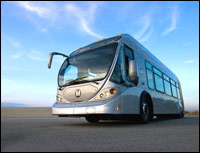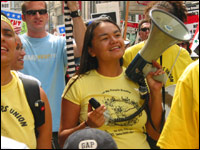
Francisca Porchas.
What work do you do?
I am a lead organizer with the Labor/Community Strategy Center and the Bus Riders Union‘s Clean Air, Clean Lungs, Clean Buses Campaign, based in Los Angeles.
How does it relate to the environment?
The Strategy Center has engaged in environmental-justice and civil-rights campaigns for the last 17 years, combining grassroots organizing and policy work with a strategy that challenges market-driven social policy. The Strategy Center includes the Wilmington Labor/Community Watchdog that fights corporate polluters in the Los Angeles port area and the Bus Riders Union that takes on the Los Angeles County Metropolitan Transportation Authority. Our victories include replacing 2,000 diesel buses with 2,000 compressed natural-gas buses.
What are you working on at the moment? Any major projects?

Get a ticket to ride one of L.A.’s natural-gas buses.
Photo: L.A. County MTA.
The Clean Air, Clean Lungs, Clean Buses campaign is a long-term campaign to dramatically reduce toxic air contaminants and greenhouse gases that cause climate change, mostly impacting black, Latino, and Asian/Pacific Islander low-income communities while wreaking havoc in the Third World. Our primary focus is on the reduction of auto use and the expansion of public transportation in Los Angeles County. After all, with 10 million people and 8 million cars in Los Angeles, and with the U.S. emitting 25 percent of the world’s greenhouse gases, we are a big part of the world’s problem and must be part of the world’s solution.
One of the BRU’s immediate goals is to create bus-only lanes in 29 major corridors in Los Angeles County as dramatic changes in mass-transit public policy can lead to rapid changes in public health.
What long and winding road led you to your current position?
My first and most profound transformative political experience was migrating to the U.S. from Sonora, Mexico, at the age of 9. It was not until I traveled back to my native Mexico that I began to make connections between U.S. foreign policy and the profound poverty and never-ending migration of my country’s people, and that I began to understand the need to organize low-income communities like my own.

Francisca Porchas campaigns with the Bus Riders Union.
Searching for training, I worked with the Union Summer Program organizing security guards in San Francisco and Los Angeles, as well as the Center for Third World Organizing’s Movement Activist Apprenticeship Program, where I organized in South Los Angeles around health-care issues. I wanted to be an internationalist, class-conscious organizer challenging racism and sexism in a direct organizing campaign, so I applied for the Strategy Center’s National School for Strategic Organizing and stayed on as an organizer.
Where were you born? Where do you live now?
I was born in Cananea, a small mining town in Sonora, Mexico. Today, I live in Los Angeles.
Do you see environmental ills disproportionately afflicting the communities where you live and work?
Low-income and poor communities of color inside the United States are usually the ones living next to smog-ridden freeways and toxic oil refineries. As a result, they are struck the hardest by higher rates of asthma, leukemia, and lung cancer while lacking living wages and health care for their children. At the same time, transnational corporate environmental degradation and “extreme weather” events caused by global warming wreak havoc in places like New Orleans and on whole Third World nations — from Shell’s destruction of the environment in Nigeria to mudslides in Guatemala that convert whole indigenous Mayan villages into mass grave sites.
How can the environmental movement cast a wider net culturally and become a bigger-tent issue politically?
Be the most anti-racist environmental movement possible. Whether addressing recycling, alternative fuels, or regulating corporate polluters, we should always be advocating for policies that are conscious of the survival and well-being of poor, working-class communities of color and Third World communities.
What environmental offense has infuriated you the most?
Traveling to New Orleans was very painful and profoundly transformative. Volunteering in ongoing rebuilding efforts, I heard dozens of black folks speak about the meaning of their historical ancestral home, tracing their lineage in New Orleans to their enslaved grandmothers and grandfathers. This community, which has confronted decades of structural unemployment, police brutality, and high levels of toxic exposure left by polluting industries, was left to die by the very government that continues to be the leading emitter of greenhouse gases in the world.
Who is your environmental hero?
The indigenous peoples of the Pacific islands of Tuvalu, a group of nine islands that are home to 11,000 people. Tuvalu is currently demanding that the U.S. government and all other industrialized nations reduce greenhouse gases by at least 50 percent, in a race against the devastating effects of global warming that are submerging their ancestral home under water.
What’s your environmental vice?
Often forgetting to recycle.
What’s your favorite place or ecosystem?
The Chiapas Mountains, where you don’t know where the mountains start and the clouds begin.
If you could institute by fiat one environmental reform, what would it be?
Reduce U.S. greenhouse gases by at least 50 percent by having stringent regulations on all greenhouse-gas-spewing industries.
If you could have every InterActivist reader do one thing, what would it be?
Donate to the Strategy Center, buy from Strategy Center Publications, and tune in to the Strategy Center’s radio show, “Voices from the Frontlines,” on Pacifica station 90.7 KPFK every Monday from 4 to 5 p.m. in Los Angeles, or streaming live on the KPFK website.

